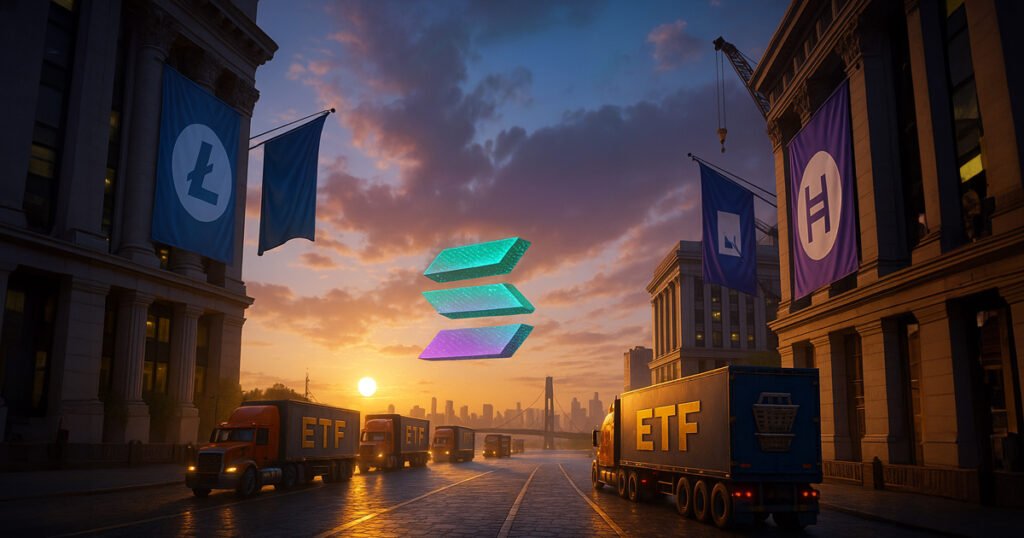Exciting News: Four Altcoin ETFs Launch in the U.S.
On October 28, 2023, a significant milestone in cryptocurrency investment occurs with the launch of four altcoin exchange-traded funds (ETFs) in the United States. These ETFs represent a significant shift as they will be the first non-Bitcoin, non-Ethereum spot crypto ETFs to hit the markets. The introduction of these altcoin ETFs is expected to spark renewed interest in altcoin investments after an extended period of market consolidation. With such a transformative move on the horizon, the cryptocurrency space is poised for potential growth and diversification.
First Four ETFs: A Game Changer
Among the first ETFs to start trading is the Bitwise Solana Staking ETF (BSOL), which confirmed its trading commencement on the NYSE. Grayscale’s Solana ETF is also set to transition to a trading model just a day later. Bloomberg’s senior ETF analyst, Eric Balchunas, expressed confidence in the launches, stating, "Assuming there’s not some last-minute SEC intervention, looks like this is happening." The approval of these products reflects a broader acceptance of cryptocurrency as an asset class, paving the way for more sophisticated investment vehicles.
Institutional Engagement and Market Preparedness
The groundwork laid by firms specializing in crypto infrastructure has been pivotal to this launch. Thomas Uhm, the Chief Commercial Officer at Jito, noted that the approvals validate the operational groundwork that has been in preparation for months. This includes building relationships with qualified custodians and market makers, crucial for ensuring adequate liquidity. Uhm stated, “We’ve been sitting on the precipice of this moment… The approval of staked Solana ETFs is a significant step for institutional access to crypto.”
Competitive Edge: Staking Benefits
What differentiates the newly introduced Solana ETFs from the Ethereum spot ETFs launched earlier is the built-in staking component. The Ethereum ETFs, which debuted in July 2024, did not include staking due to regulatory issues. This feature makes the Solana products particularly appealing, as they offer added yield through staking benefits. Uhm emphasized the importance of these relationships in effectively communicating the advantages of liquid staking within such structures, making these investments more lucrative for institutional players.
Market Demand Beyond Bitcoin and Ethereum
The launch of these altcoin ETFs signals a broader trend that goes beyond Bitcoin and Ethereum. The entry of regulated products involving altcoins like Solana, Litecoin (LTC), and Hedera (HBAR) tests whether institutional demand can extend to these cryptocurrencies. It remains to be seen if these products will be able to absorb supply without the kind of volatility that has historically characterized altcoin rallies. By offering sophisticated vehicles for investment, these ETFs could attract institutional capital that has hesitated to enter the cryptocurrency market until now.
Conclusion: Future Implications of Altcoin ETFs
As the cryptocurrency landscape continues to evolve, the launches of these four altcoin ETFs could be a turning point for broader acceptance and investment in digital assets. With institutional players increasingly showing interest, the groundwork is set for sustainable growth in this sector. The approval of the Bitwise Solana Staking ETF and others signifies a new chapter wherein traditional investors may feel comfortable diversifying their portfolios with cryptocurrencies beyond Bitcoin and Ethereum. As the market matures and institutions engage further, the implications for cryptocurrency investment and price stability could be profound.
In summary, the introduction of these altcoin ETFs not only marks a significant development in the realm of digital assets but also showcases an evolving landscape that fosters institutional investment and potentially stabilizes altcoin markets.


